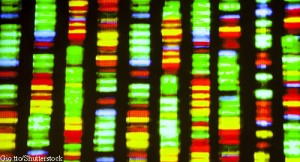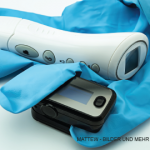 Many children come to pediatric clinics with periodic fevers resulting from undefined, systemic autoinflammatory disease. A study published in the Annals of Rheumatic Diseases described clinical characteristics, treatment outcomes and genetic findings in 187 patients.1
Many children come to pediatric clinics with periodic fevers resulting from undefined, systemic autoinflammatory disease. A study published in the Annals of Rheumatic Diseases described clinical characteristics, treatment outcomes and genetic findings in 187 patients.1
“Recurrent fever is a common complaint in childhood,” says co-lead author Joost Frenkel, professor of pediatrics at Utrecht University, The Netherlands. “Some have definite hereditary disorders that have been examined extensively. In the vast majority of patients with systemic autoinflammatory disease, no mutant gene can be identified, and this group has never been described in any detail.”
Eurofever Register Finds Patients
To address these issues with an ultimate aim of achieving better diagnostic and treatment options, researchers extracted clinical and genetic data from the Eurofever registry, an international registry that collects retrospective data on patients with autoinflammatory diseases.
Seven of the 187 study patients had a chronic disease course, and the rest were classified as recurrent. The median age at onset was 4.3 years. The patients had a median number of 12 episodes of recurrent fever per year, with a median duration of four days.
The most common symptoms in addition to recurrent fever were arthralgias, myalgias, abdominal pain, fatigue, malaise and mucocutaneous manifestations. Relatives had also reported symptoms in 24 cases.
Patients & Patterns
“Autoinflammatory diseases are an expanding group of inherited and multifactorial diseases,” says co-lead author Marco Gattorno, MD, of the Center for Autoinflammatory Diseases and Immunodeficiency at IRCCS Instituto Gianna Gaslini, Genoa, Italy. “Besides a few rare, inherited monogenic and some other well-defined multifactorial conditions, patients present with a phenotype strongly consistent with an autoinflammatory condition that cannot be properly classified in any of the known conditions. These patients represent more than 60–70% of the individuals presenting to tertiary centers for autoinflammatory diseases and are gathered under the term of undefined autoinflammatory diseases.”
Most participants responded well to non-steroidal anti-inflammatory drugs (NSAIDs), corticosteroids, colchicine and anakinra. Complete remission was seldom achieved by NSAID use alone.
“We found a wide variety of clinical presentations in a cohort of 187 patients,” says Prof. Frenkel. “However, within this group some patterns emerged.”
Patients with pericarditis (n=11) were older at disease onset (33.8 years) and had fewer yearly episodes of fever (3.0/year). Those with intellectual impairments were younger at disease onset (2.2 years) and often had family members who also had systemic autoinflammatory disease.
Genetic Analysis
Analysis of one or more systemic autoinflammatory disease-related genes was performed by either complete gene screening of the most relevant exons or screening most likely point mutations in 159 patients (85.0%). In total, 15 patients carried likely pathogenic variants or variants of uncertain significance. Two had a genetic variant in the NLRP3 gene, seven in the MEFV gene, two in the MVK gene, four in the TNFRSF1A gene and one had a variant in the NOD2 gene. One patient presented with variants found in two genes: the p.R92Q variant of the TNFRSF1A gene and the p.V198M variant of the NLRP3 gene.
“Some families showing similar phenotypes were also included [in the analysis],” says Dr. Gattorno. “These families are interesting for their possible inclusion in genetic studies aimed at identifying new genes.”
The main message of the paper, according to Dr. Frenkel, is the recognition of the patients as a group. How specific symptoms and genetic traits can be used to identify patients with similar profiles across multiple centers. This finding should also aid in future research working to identify new autoinflammatory disease.
Study Limitations
Among the limitations cited by the authors, one is the retrospective nature of its design. They could not exclude a selection bias related to the possibility that more severe patients are being entered into the registry. For some patients, parts of the clinical presentation were missing and not retraceable. A lack of prospective follow-up information makes it difficult to give guidance regarding outcomes and long-term response in these patients.
Finally, the treatment response was hard to interpret. It was unknown how much change was related to the natural course of the disease or simultaneous use of other drugs. Researchers hope the establishment of a follow-up registry by the Eurofever work group may answer these questions in the future.
“A thorough family history may identify novel, genetic autoinflammatory syndromes currently hidden within a large, heterogeneous group,” he says. “Currently, no evidence-based therapy is available for [those with recurrent fevers]. From the data, it seems justified to assess common anti-inflammatory agents in a trial-and-error approach.”
Needed Research
Sangeeta Dileep Sule, MD, PhD, chief of the Division of Rheumatology at Children’s National Hospital, Washington, D.C., thinks this is a study that needed to be done.
“A large portion of the patients who come to our clinic with periodic fever syndrome present with a systemic autoimmune disease that doesn’t fit any of the [known] genetic diseases,” she says. “They aren’t given a named diagnosis, yet they have something that is systemic and without a genetic history. We [don’t] know how to treat or monitor them.”
She sees this as a first step toward naming some of these syndromes. Now, it’s possible for physicians to cluster some of these periodic fever syndrome patients. They may have specific genetic changes that haven’t been identified yet, but may be identifiable now that a specific clinical phenotype of fevers, skin rashes and other systemic complaints, such as arthritis or serositis, has been developed.
“An individual physician is going to see a handful of periodic fever syndrome patients,” says Dr. Sule. “The best thing is for [rheumatologists] to be made aware that undifferentiated autoimmune patients can present with significant organ involvement, such as pericarditis and neurocognitive disease. Genetic testing, as it becomes cheaper, is very important and will move the field forward.”
Kurt Ullman is a freelance writer based in Indiana.
Reference
- Ter Haar NM, Eijkelboom C, Cantarini L, et al. Clinical characteristics and genetic analyses of 187 patients with undefined autoinflammatory diseases. Ann Rheum Dis. 2019 Oct;78(10):1405–1411. Epub 2019 Jul 5.



